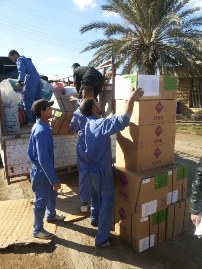House to house campaign to vaccinate children in conflict affected areas in Iraq against polio, measles and rubella
BAGHDAD, 18 December 2016 – The Federal Ministry of Health in coordination with the Kurdistan Region Ministry of Health and with the support of UNICEF and the World Health Organization (WHO), today launched a 12-day campaign to immunize Iraq’s children against polio and measles.
The winter campaign aims to reach some 800 000 children under the age of five living in Iraq’s most vulnerable governorates of Anbar, Salahaddin, Kirkuk, newly retaken areas in Ninewah, and displaced children living in camps in the Kurdistan region.
This campaign is part of the vaccination strategy in response to the Mosul Operations. Vaccination teams will be going house to house and tent to tent to ensure that all targeted children are covered. Children below five years will be given polio drops and children aged 9 months to 5 years will be given measles and rubella vaccinations.
“For some of these children, this is the first time they will receive vaccines in two years,” said UNICEF Representative in Iraq Peter Hawkins. “The Government of Iraq is committed to keeping Iraq polio free and preventing any measles outbreak. It has conducted 20 campaigns to successfully combat the Middle East polio outbreak.”
Three nationwide vaccination rounds against polio have already been successfully implemented this year, in February, April and October, in addition to two targeted campaigns against polio and measles in Anbar, and one each in Dabaga Camp and Al-Qayyara.
“The great achievement of protecting children in Iraq from polio has to be maintained through active partnership and collaborative efforts,” said Altaf Musani, WHO Representative in Iraq. “Iraq has endemic transmission of measles and the disease can be fatal particularly in times of crisis. Targeted emergency campaigns in newly retaken areas and IDP camps have helped prevent outbreaks of measles and polio,” he added.
Since April 2014, no new polio cases have been reported in Iraq thanks to the government’s strong commitment and frontline health workers’ dedication.
Although Iraq was removed from the list of polio-infected countries in May 2015, the risks of a resurgence of polio in Iraq persist due to surveillance and immunization coverage gaps in conflict zones.
UNICEF will provide for the costs of the vaccines, incentives for vaccinators and social mobilization in support of the Federal and Kurdistan Region Ministries of Health, while WHO will cover the transportation costs and campaign monitoring by volunteers of the Iraqi Red Crescent Society. Public health staff from both UNICEF and WHO will support the Departments of Health in supervising and monitoring the campaign.
Zain Telecommunications Company will support the campaign by sending SMSs to reach displaced Iraqis.
For more information, please contact:
Sharon Behn Nogueira, UNICEF Iraq Chief of Communications, +964 782 782 0238,
Ajyal Sultany, WHO Communications Officer,
WHO delivers emergency health kits to Dhuluiya in Salah Aldin
 These five WHO basic kits were part of the United Nations interagency emergency response to the critical needs of Dhuluiya's population Erbil, January 2015 – To serve the population that has been under siege for seven months and minimize the challenges they face in terms of limited access to health care and lack of life saving medicines, WHO delivered five basic units of interagency emergency health kits to the Dhuluiya district in the Salah Aldin governorate. The kits, delivered on 8 January 2015, contained medicines sufficient to cover the needs of 5000 people for three months.
These five WHO basic kits were part of the United Nations interagency emergency response to the critical needs of Dhuluiya's population Erbil, January 2015 – To serve the population that has been under siege for seven months and minimize the challenges they face in terms of limited access to health care and lack of life saving medicines, WHO delivered five basic units of interagency emergency health kits to the Dhuluiya district in the Salah Aldin governorate. The kits, delivered on 8 January 2015, contained medicines sufficient to cover the needs of 5000 people for three months.
“The emergency health kits that WHO provided are part of the joint UN response to an estimated population of 1200 families in Dhuluiya; WHO is here to save lives of people in critical humanitarian settings through delivering the much needed health technologies”, said Dr Jaffer Hussain, WHO Representative and Head of Mission, WHO, Iraq.
Dr Jaffer added that, since August, 2014, WHO has delivered medical supplies for treating over 1.2 million people in Iraq, a majority of whom live in internally displaced persons (IDP) camps and hard-to-reach areas.
The district of Dhuluiya (80 km south of Tikrit, 80 km north of Baghdad) has been under months of insecurity resulting in the destruction of hundreds of houses and the displacement of thousands of people. An estimated 1200 Dhuluiya families, including IDPs from Al-Alam district gave an urgent appeal for humanitarian assistance met by the immediate response of WHO and other UN partners.
To meet the health needs of the affected population and returnees from the displacement camps, WHO will continue monitoring the health situation of the population in Dhuluiya and coordinate efforts with Salah Aldin directorate of health to assess the urgent needs of the health facilities operating in the governorate and prepare for the required response through a disease surveillance system, in government and opposition-controlled areas, reporting on a weekly basis.
As needs continue to rise, WHO will also provide additional medical supplies, strengthen disease surveillance in the wake of the winter season and monitors the ongoing health needs.
For more information, please contact:
Ms Pauline Ajello, Communications and Donor Relations Officer| 07809288618 |
Ms Ajyal Sultany, Communications Officer| 07809269506 |


